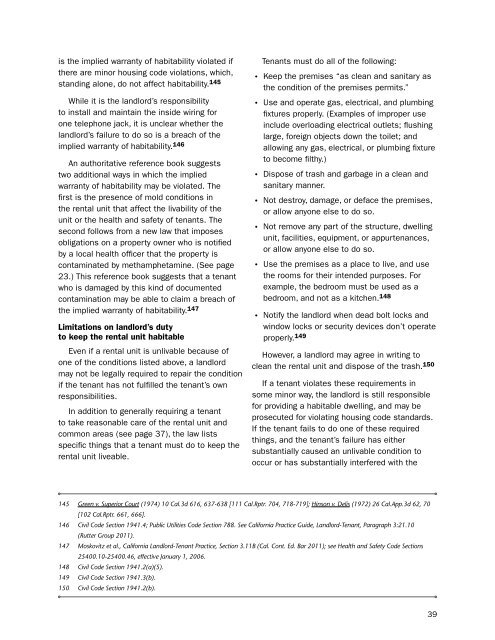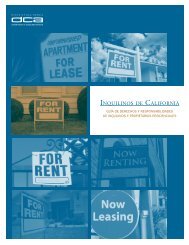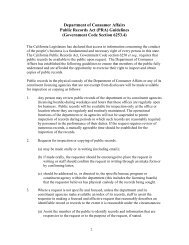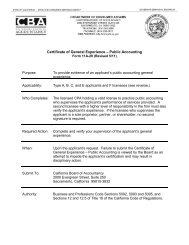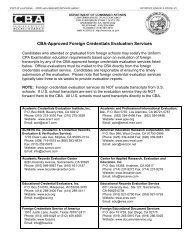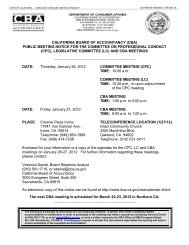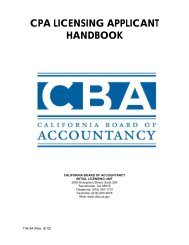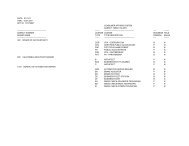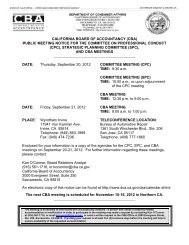California Tenants - Department of Consumer Affairs - State of ...
California Tenants - Department of Consumer Affairs - State of ...
California Tenants - Department of Consumer Affairs - State of ...
Create successful ePaper yourself
Turn your PDF publications into a flip-book with our unique Google optimized e-Paper software.
is the implied warranty <strong>of</strong> habitability violated if<br />
there are minor housing code violations, which,<br />
standing alone, do not affect habitability. 145<br />
While it is the landlord’s responsibility<br />
to install and maintain the inside wiring for<br />
one telephone jack, it is unclear whether the<br />
landlord’s failure to do so is a breach <strong>of</strong> the<br />
implied warranty <strong>of</strong> habitability. 146<br />
An authoritative reference book suggests<br />
two additional ways in which the implied<br />
warranty <strong>of</strong> habitability may be violated. the<br />
first is the presence <strong>of</strong> mold conditions in<br />
the rental unit that affect the livability <strong>of</strong> the<br />
unit or the health and safety <strong>of</strong> tenants. the<br />
second follows from a new law that imposes<br />
obligations on a property owner who is notified<br />
by a local health <strong>of</strong>ficer that the property is<br />
contaminated by methamphetamine. (see page<br />
23.) this reference book suggests that a tenant<br />
who is damaged by this kind <strong>of</strong> documented<br />
contamination may be able to claim a breach <strong>of</strong><br />
the implied warranty <strong>of</strong> habitability. 147<br />
limitations on landlord’s duty<br />
to keep the rental unit habitable<br />
even if a rental unit is unlivable because <strong>of</strong><br />
one <strong>of</strong> the conditions listed above, a landlord<br />
may not be legally required to repair the condition<br />
if the tenant has not fulfilled the tenant’s own<br />
responsibilities.<br />
in addition to generally requiring a tenant<br />
to take reasonable care <strong>of</strong> the rental unit and<br />
common areas (see page 37), the law lists<br />
specific things that a tenant must do to keep the<br />
rental unit liveable.<br />
tenants must do all <strong>of</strong> the following:<br />
• Keep the premises “as clean and sanitary as<br />
the condition <strong>of</strong> the premises permits.”<br />
• use and operate gas, electrical, and plumbing<br />
fixtures properly. (examples <strong>of</strong> improper use<br />
include overloading electrical outlets; flushing<br />
large, foreign objects down the toilet; and<br />
allowing any gas, electrical, or plumbing fixture<br />
to become filthy.)<br />
• dispose <strong>of</strong> trash and garbage in a clean and<br />
sanitary manner.<br />
• not destroy, damage, or deface the premises,<br />
or allow anyone else to do so.<br />
• not remove any part <strong>of</strong> the structure, dwelling<br />
unit, facilities, equipment, or appurtenances,<br />
or allow anyone else to do so.<br />
• use the premises as a place to live, and use<br />
the rooms for their intended purposes. For<br />
example, the bedroom must be used as a<br />
bedroom, and not as a kitchen. 148<br />
• notify the landlord when dead bolt locks and<br />
window locks or security devices don’t operate<br />
properly. 149<br />
however, a landlord may agree in writing to<br />
clean the rental unit and dispose <strong>of</strong> the trash. 150<br />
if a tenant violates these requirements in<br />
some minor way, the landlord is still responsible<br />
for providing a habitable dwelling, and may be<br />
prosecuted for violating housing code standards.<br />
if the tenant fails to do one <strong>of</strong> these required<br />
things, and the tenant’s failure has either<br />
substantially caused an unlivable condition to<br />
occur or has substantially interfered with the<br />
145 Green v. Superior Court (1974) 10 Cal.3d 616, 637-638 [111 Cal.Rptr. 704, 718-719]; Hinson v. Delis (1972) 26 Cal.App.3d 62, 70<br />
[102 Cal.Rptr. 661, 666].<br />
146 Civil Code Section 1941.4; Public Utilities Code Section 788. See <strong>California</strong> Practice Guide, Landlord-Tenant, Paragraph 3:21.10<br />
(Rutter Group 2011).<br />
147 Moskovitz et al., <strong>California</strong> Landlord-Tenant Practice, Section 3.11B (Cal. Cont. Ed. Bar 2011); see Health and Safety Code Sections<br />
25400.10-25400.46, effective January 1, 2006.<br />
148 Civil Code Section 1941.2(a)(5).<br />
149 Civil Code Section 1941.3(b).<br />
150 Civil Code Section 1941.2(b).<br />
39


